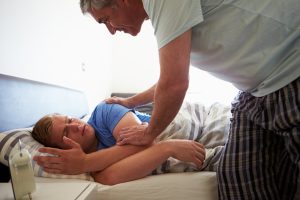Bangungot refers to a condition where an individual experiences distressing symptoms during sleep, such as waking up suddenly, groaning, having nightmares, feeling a weight pressing on their chest, or a combination of these symptoms. It is more commonly observed in men, particularly younger males aged 17 to 30, and often affects those living far from their families. Although it is predominantly seen in men, women can also experience bangungot. The condition is often thought to “run in the blood,” meaning some families are more predisposed to it.
Bangungot does not have an exact English translation. While the term “nightmare” is sometimes used, it fails to capture the depth and cultural meaning of bangungot for Filipinos. According to Professor Michael Tan from the University of the Philippines, similar phenomena exist in neighboring countries, such as “lai tai” in Thailand and “tsob tsuang” in Vietnam, suggesting a shared cultural and physiological experience.
Why Does Bangungot Occur?
According to traditional beliefs, bangungot is caused by sleeping immediately after eating a heavy meal or drinking large amounts of alcohol. Modern medicine, however, links it to medical conditions such as acute pancreatitis or cardiac disorders like Brugada syndrome—a heart condition most commonly affecting Asian males. Currently, Brugada syndrome is the leading medical explanation for bangungot, but because this connection is not definitive, the condition is often categorized under “Sudden Unexpected Death Syndrome” (SUDS).
Professor Tan posits that bangungot may not stem from a single condition but rather a combination of various factors, which aligns with its complex and multifaceted nature.
Is There a Remedy for Bangungot?

According to traditional practices, waking someone up immediately when they are experiencing bangungot is crucial. Moving a finger or any body part is also advised to help “escape” from the episode.
Since bangungot remains under study, there are no formal medical guidelines for its management. However, it should be treated as a medical emergency. Immediate medical attention is necessary, and the individual should be taken to a hospital as soon as possible. If Brugada syndrome is confirmed, diagnostic tests like an ECG should be conducted to monitor heart activity, and treatment should be administered accordingly.
How Can Bangungot Be Prevented?
Traditional advice suggests avoiding heavy meals or consuming large amounts of alcohol before sleeping to prevent bangungot.
While there are no established medical guidelines for prevention, the following measures are recommended:
- Seek medical evaluation. If you or someone you know experiences symptoms of bangungot, consult a doctor to rule out underlying conditions, such as heart disease or pancreatitis, that may complicate the condition.
- Prepare for emergencies. Ensure that you or your family members can access emergency care promptly if an episode occurs.
- Monitor your health. Regular check-ups can help identify and manage risk factors, potentially reducing the likelihood of experiencing bangungot-related complications.
Although more research is needed to understand this condition fully, treating it with urgency and consulting medical professionals can save lives and improve outcomes. If you suspect you are at risk or have experienced symptoms, do not hesitate to seek help.


